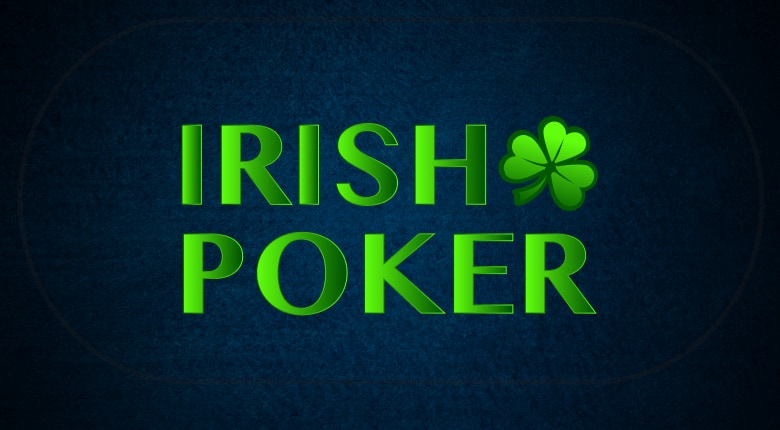In the realm of poker variants, Irish Poker stands out as a captivating and dynamic game that combines elements of Texas Hold’em and Omaha while adding its unique twist. With its origins rooted in Ireland, this variant has gained popularity among poker enthusiasts worldwide for its strategic depth, fast-paced gameplay, and potential for thrilling showdowns. Let’s delve into the fascinating world of Irish Poker, exploring its history, rules, and strategies.
Origins and History
Irish Poker traces its roots back to the Emerald Isle, where it emerged as a popular variation of traditional poker games. While the exact origins of the game are unclear, it is believed to have gained prominence in Irish poker rooms and home games before spreading to other parts of the world.
The game’s unique blend of Texas Hold’em and Omaha elements captured the imagination of players, leading to its inclusion in various poker tournaments and cash games. Today, Irish Poker enjoys a dedicated following in both live and online poker communities, with players drawn to its strategic nuances and unpredictable nature.
Rules of the Game
Irish Poker follows a similar structure to Texas Hold’em but introduces a twist that adds an extra layer of complexity and excitement to the game. Here’s how it’s played:
- Starting Hands: Each player is dealt four hole cards face down, instead of the two cards typically dealt in Texas Hold’em.
- Preflop Betting: After receiving their hole cards, the first round of betting ensues, starting with the player to the left of the dealer button. Players have the option to fold, call, or raise, based on the strength of their hands.
- The Flop: Following the preflop betting round, the dealer reveals the first three community cards, known as the flop. These cards are placed face up in the center of the table and are available to all players to use in combination with their hole cards.
- Second Betting Round: Another round of betting takes place, starting with the player to the left of the dealer button. Players can now choose to check, bet, call, raise, or fold based on their hand’s potential and the community cards on the table.
- The Turn: After the second betting round concludes, the dealer reveals the fourth community card, known as the turn. This card is added to the three existing flop cards, further shaping players’ potential hands.
- Third Betting Round: A third round of betting follows the turn, allowing players to continue assessing their hand strength and strategizing their next moves.
- The River: The final community card, known as the river, is revealed by the dealer. With all five community cards now visible, players have a complete picture of their potential hand combinations.
- Final Betting Round and Showdown: The last round of betting occurs, followed by the showdown. Players remaining in the hand reveal their hole cards, and the best five-card hand wins the pot.
Strategies and Tips
Mastering Irish Poker requires a blend of skill, strategy, and adaptability. Here are some key strategies and tips to help you succeed:
- Starting Hand Selection: Given that players receive four hole cards in Irish Poker, starting hand selection is crucial. Focus on hands with strong potential for high-ranking combinations, such as pairs, suited connectors, and high-ranking cards of the same suit.
- Positional Awareness: As in other poker variants, positional awareness is essential in Irish Poker. Pay close attention to your position relative to the dealer button, as this will influence your betting decisions throughout the hand.
- Reading the Board: With five community cards available, reading the board accurately is paramount. Consider the potential combinations and draws available to you and your opponents, and adjust your strategy accordingly.
- Bet Sizing and Aggression: Effective bet sizing and aggression can help you gain control of the pot and put pressure on your opponents. Mix up your betting patterns to keep your opponents guessing and avoid becoming predictable.
- Pot Odds and Equity: Understanding pot odds and equity is essential in Irish Poker. Calculate your chances of completing draws or improving your hand against the pot odds to make informed decisions about calling or folding.
- Positional Bluffing: Utilize your position to bluff effectively, particularly in late position or on the button. Aggressive betting and well-timed bluffs can force opponents to fold weaker hands, allowing you to win pots without showdown.
- Table Image: Be mindful of your table image and how it influences your opponents’ perceptions of your playstyle. Adjust your strategy based on how others perceive you, and use your table image to your advantage when making strategic moves.
- Practice and Experience: Like any poker variant, mastering Irish Poker requires practice, experience, and continuous learning. Dedicate time to studying the game, analyzing hand histories, and honing your skills through regular gameplay.
Conclusion
Irish Poker offers a captivating blend of excitement, strategy, and skill that appeals to players of all levels. Whether you’re a seasoned pro or a novice player, mastering the intricacies of this variant can provide endless hours of enjoyment and challenge. By understanding the rules, implementing sound strategies, and honing your skills through practice, you can elevate your Irish Poker game to new heights and compete successfully in the dynamic world of poker.
Irish Poker FAQ
1. What is Irish Poker?
Irish Poker is a variant of Texas Hold’em where players are dealt four hole cards instead of two.
2. How is Irish Poker Played?
Players start with four hole cards, followed by a round of betting. After the flop, players must discard two hole cards, and the game proceeds as usual with the turn and river.
3. What are the Key Differences from Texas Hold’em?
The main difference is the number of hole cards dealt and the discard phase after the flop, which adds an extra layer of strategy.
4. What Strategies Should I Use in Irish Poker?
Focus on starting hands with potential for strong post-flop hands. Pay attention to opponents’ betting patterns and adjust your strategy accordingly.
5. Where Can I Play Irish Poker?
Irish Poker is available in some online poker rooms and select brick-and-mortar casinos that offer poker variants.
6. Any Tips for Success in Irish Poker?
Understand hand rankings, observe opponents, and practice patience for optimal results. Additionally, adapt your strategy based on the dynamic nature of the game.
7. Is Irish Poker Suitable for Beginners?
While Irish Poker may have a slightly steeper learning curve due to its unique rules, beginners can still enjoy the game by starting with basic strategies and gradually building their skills.
8. Can I Play Irish Poker Online?
Yes, many online poker platforms offer Irish Poker games and tournaments, allowing players to enjoy the variant from the comfort of their own homes.
Also Read: https://alpinecasino.co.uk/

